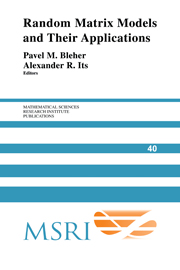Book contents
- Frontmatter
- Contents
- Preface
- Symmetrized Random Permutations
- Hankel Determinants as Fredholm Determinants
- Universality and Scaling of Zeros on Symplectic Manifolds
- z-Measures on Partitions, Robinson-Schensted-Knuth Correspondence, and β = 2 Random Matrix Ensembles
- Phase Transitions and Random Matrices
- Matrix Model Combinatorics: Applications to Folding and Coloring
- Interrelationships Between Orthogonal, Unitary and Symplectic Matrix Ensembles
- Dual Isomonodromic Tau Functions and Determinants of Integrable Fredholm Operators
- Functional Equations and Electrostatic Models for Orthogonal Polynomials
- Random Words, Toeplitz Determinants, and Integrable Systems I
- Random Permutations and the Discrete Bessel Kernel
- Solvable Matrix Models
- The τ-Function for Analytic Curves
- Integration over Angular Variables for Two Coupled Matrices
- Integrable Lattices: Random Matrices and Random Permutations
- SL(2) and z-Measures
- Some Matrix Integrals Related to Knots and Links
Random Words, Toeplitz Determinants, and Integrable Systems I
Published online by Cambridge University Press: 25 June 2025
- Frontmatter
- Contents
- Preface
- Symmetrized Random Permutations
- Hankel Determinants as Fredholm Determinants
- Universality and Scaling of Zeros on Symplectic Manifolds
- z-Measures on Partitions, Robinson-Schensted-Knuth Correspondence, and β = 2 Random Matrix Ensembles
- Phase Transitions and Random Matrices
- Matrix Model Combinatorics: Applications to Folding and Coloring
- Interrelationships Between Orthogonal, Unitary and Symplectic Matrix Ensembles
- Dual Isomonodromic Tau Functions and Determinants of Integrable Fredholm Operators
- Functional Equations and Electrostatic Models for Orthogonal Polynomials
- Random Words, Toeplitz Determinants, and Integrable Systems I
- Random Permutations and the Discrete Bessel Kernel
- Solvable Matrix Models
- The τ-Function for Analytic Curves
- Integration over Angular Variables for Two Coupled Matrices
- Integrable Lattices: Random Matrices and Random Permutations
- SL(2) and z-Measures
- Some Matrix Integrals Related to Knots and Links
Summary
It is proved that the limiting distribution of the length of the longest weakly increasing subsequence in an inhomogeneous random word is related to the distribution function for the eigenvalues of a certain direct sum of Gaussian unitary ensembles subject to an overall constraint that the eigenvalues lie in a hyperplane.
1. Introduction
A class of problems — important for their applications to computer science and computational biology as well as for their inherent mathematical interest — is the statistical analysis of a string of random symbols. The symbols, called letters, are assumed to belong to an alphabet A of fixed size k. The set of all such strings (or words) of length N, W(A,N), forms the sample space in the statistical analysis of these strings. A natural measure on W is to assign each letter equal probability, namely 1/ k, and to define the probability measure on words by the product measure. Thus each letter in a word occurs independently and with equal probability. We call such random word models homogeneous. Of course, for some applications, each letter in the alphabet does not occur with the same frequency and it is therefore natural to assign to each letter i a probability pi. If we again use the product measure for the words (letters in a word occur independently), then the resulting random word models are called inhomogeneous. Fixing an ordering of the alphabet A, a weakly increasing subsequence of a Word.
Information
- Type
- Chapter
- Information
- Random Matrix Models and their Applications , pp. 245 - 258Publisher: Cambridge University PressPrint publication year: 2001
Accessibility standard: Unknown
Why this information is here
This section outlines the accessibility features of this content - including support for screen readers, full keyboard navigation and high-contrast display options. This may not be relevant for you.Accessibility Information
- 2
- Cited by
